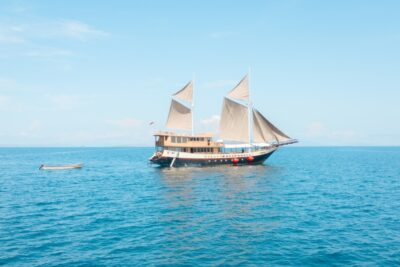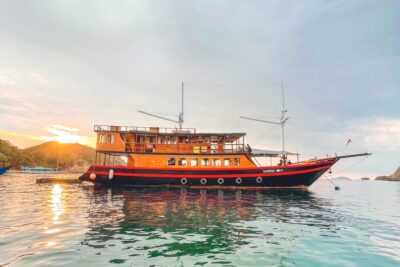Got Questions? We’re Here to Help Get You Started with Our Product.
Q: What are the must-visit destinations in Indonesia?
A: Indonesia boasts a plethora of incredible destinations, but some must-visits include Bali for its stunning beaches and vibrant culture, Yogyakarta for its rich heritage and ancient temples like Borobudur and Prambanan, and Komodo Island to see the famous Komodo dragons in their natural habitat.
Q: What activities can tourists enjoy in Indonesia?
A: Tourists can enjoy a wide range of activities in Indonesia, including surfing in Bali, hiking to volcanic peaks like Mount Bromo and Mount Rinjani, diving and snorkeling in Raja Ampat and the Gili Islands, exploring traditional markets and cultural sites, and indulging in delicious Indonesian cuisine.
Q: What is the best time to visit Indonesia?
A: The best time to visit Indonesia depends on the region you plan to visit. Generally, the dry season from April to October is considered the best time to visit many parts of Indonesia, including Bali, Java, and Lombok. However, certain destinations like Raja Ampat and Komodo National Park have their peak seasons during different times of the year.
Q: What are the visa requirements for visiting Indonesia?
A: Most tourists can enter Indonesia visa-free for short stays of up to 30 days, with some exceptions. However, travelers should ensure their passport is valid for at least six months beyond their intended stay and check the latest visa regulations before traveling.
Q: What transportation options are available for getting around Indonesia?
A: Indonesia offers various transportation options for getting around, including domestic flights between major cities and islands, private car hire with drivers for convenient travel within cities, motorcycle rentals for exploring local areas, and public transportation such as buses and trains.
Q: Are there any health or safety precautions travelers should be aware of?
A: Travelers to Indonesia should be up to date on routine vaccinations and consider additional vaccinations for diseases like hepatitis A and typhoid. It’s also important to take precautions against mosquito-borne illnesses like dengue fever and malaria. Additionally, travelers should exercise caution when swimming, follow local safety guidelines, and be mindful of their belongings to prevent theft.
Q: What cultural etiquette should tourists observe in Indonesia?
A: Tourists should respect local customs and traditions when visiting Indonesia. This includes dressing modestly, especially when visiting temples and religious sites, removing shoes before entering someone’s home or a place of worship, and using the right hand for giving and receiving objects. It’s also polite to learn a few basic Indonesian phrases and greet locals with a smile.
Q: What are some popular souvenirs to buy in Indonesia?
A: Popular souvenirs to buy in Indonesia include batik textiles, traditional handcrafted items like wood carvings and silver jewelry, local spices and coffee, and souvenirs featuring designs inspired by Indonesia’s diverse culture and wildlife.
Q: Can you recommend some eco-friendly and sustainable travel options in Indonesia?
A: There are several eco-friendly and sustainable travel options in Indonesia, including staying at eco-resorts that prioritize sustainability and conservation efforts, participating in community-based tourism initiatives that support local communities and the environment, and choosing responsible tour operators that minimize their environmental impact and promote conservation practices. Additionally, tourists can support wildlife conservation efforts by visiting ethical animal sanctuaries and avoiding activities that involve animal exploitation.
Q: Can you recommend some off-the-beaten-path destinations in Indonesia?
A: While popular destinations like Bali and Yogyakarta are well-known, Indonesia also boasts many off-the-beaten-path destinations waiting to be explored. These include the remote islands of Raja Ampat in West Papua, the lush rainforests and waterfalls of North Sumatra, the traditional villages and rice terraces of Flores, and the pristine beaches and coral reefs of Wakatobi in Southeast Sulawesi. Travelers seeking adventure and authentic cultural experiences will find plenty to discover in these hidden gems.
Q: What are some popular Indonesian dishes that tourists should try?
A: Some popular Indonesian dishes that tourists should try include nasi goreng (fried rice), mie goreng (fried noodles), rendang (spicy beef stew), satay (grilled skewers), gado-gado (vegetable salad with peanut sauce), and soto (aromatic soup). Don’t forget to sample local desserts like es teler (fruit cocktail with coconut milk) and klepon (sweet rice cakes filled with palm sugar).
Q: What are some adventurous activities for thrill-seekers in Indonesia?
A: Indonesia offers a wide range of adventurous activities for thrill-seekers looking for an adrenaline rush. Here are some exciting options:
- Surfing: With world-class waves and breaks, destinations like Bali, Lombok, and Mentawai Islands attract surfers from around the globe. Beginners can take lessons at surf schools, while experienced surfers can tackle challenging waves at famous breaks like Uluwatu and Padang Padang.
- White-water rafting: Experience the thrill of navigating fast-flowing rivers and rapids on white-water rafting excursions in destinations like Bali, West Java, or Central Kalimantan. Professional guides lead thrilling rafting trips suitable for all skill levels.
- Volcano trekking: Embark on a trekking adventure to Indonesia’s volcanic peaks, such as Mount Rinjani in Lombok, Mount Bromo in East Java, or Mount Agung in Bali. Summiting these majestic volcanoes offers breathtaking views and a sense of accomplishment.
- Scuba diving: Explore Indonesia’s underwater wonderland with scuba diving adventures in renowned dive destinations like Raja Ampat, Komodo National Park, and Bunaken Marine Park. Encounter vibrant coral reefs, diverse marine life, and thrilling dive sites.
- Jungle trekking: Immerse yourself in the lush rainforests of Indonesia with jungle trekking expeditions in destinations like Bukit Lawang in Sumatra, Taman Negara in Borneo, or Gunung Leuser National Park in Aceh. Spot wildlife such as orangutans, gibbons, and exotic birds in their natural habitat.
- Paragliding: Soar above stunning landscapes and coastal cliffs with paragliding adventures in destinations like Bali, Lombok, or Yogyakarta. Experienced pilots provide tandem flights, allowing thrill-seekers to enjoy panoramic views and exhilarating flights.
- Cave exploration: Discover Indonesia’s hidden underground world with cave exploration expeditions in destinations like Gunung Kidul in Yogyakarta, Goa Jomblang in Central Java, or Niah Caves in Borneo. Explore ancient caverns, underground rivers, and unique rock formations.
- Zip-lining: Zip through the treetops and canopy forests on exhilarating zip-lining adventures in destinations like Bali Treetop Adventure Park, Lombok Eco Adventure Park, or Bukit Lawang Jungle Trekking in Sumatra. Enjoy aerial views and adrenaline-pumping thrills.
- Cliff jumping: Take the plunge and leap off towering cliffs into crystal-clear waters at cliff-jumping spots like Nusa Penida Island in Bali, the Gilis in Lombok, or Angel’s Billabong in Nusa Lembongan. Experience an adrenaline rush and cool off in tropical waters.
- ATV riding: Explore off-road terrain and scenic landscapes on ATV (all-terrain vehicle) adventures in destinations like Ubud in Bali, Bintan Island, or Yogyakarta. Ride through jungle trails, rice paddies, and rivers for an exhilarating outdoor experience.
Q: What are some budget-friendly travel options for backpackers in Indonesia?
A: Indonesia offers plenty of budget-friendly travel options for backpackers looking to explore the country without breaking the bank. Here are some tips:
- Accommodation: Opt for budget accommodations such as hostels, guesthouses, or homestays, which offer affordable rates and a chance to connect with fellow travelers. Dormitory-style rooms are the cheapest option, but private rooms are also available at reasonable prices.
- Street food: Enjoy delicious and affordable meals at local warungs (food stalls) and warung makan (eateries), where you can sample Indonesian cuisine like nasi goreng (fried rice), mie goreng (fried noodles), and sate (grilled skewers) for a fraction of the cost of dining at restaurants.
- Transportation: Use public transportation options like buses, angkot (minibuses), and ojeks (motorcycle taxis) to get around cities and towns. For inter-island travel, opt for economy-class trains, buses, or ferries, which offer cheaper fares compared to flights.
- Bargain shopping: Practice your bargaining skills at local markets and street vendors when shopping for souvenirs, clothing, and handicrafts. Negotiating prices is common in Indonesia and can result in significant savings.
- Free attractions: Take advantage of free or low-cost attractions and activities, such as visiting temples, exploring natural attractions like beaches and waterfalls, or attending cultural performances and festivals, which offer enriching experiences without breaking the budget.
- Group tours: Join group tours or excursions organized by local operators or hostels, which often offer discounted rates for activities like snorkeling, hiking, or city tours. Sharing costs with other travelers can help reduce expenses.
- Couchsurfing: Consider using platforms like Couchsurfing to find free accommodation with local hosts who are willing to offer a spare room or couch to travelers. This not only saves money but also provides an opportunity to connect with locals and experience Indonesian hospitality firsthand.
- Travel off-peak: Avoid traveling during peak tourist seasons and holidays, when prices for accommodations, transportation, and activities are typically higher. Instead, visit Indonesia during shoulder seasons or low seasons to take advantage of lower prices and fewer crowds.
By following these budget-friendly travel tips, backpackers can explore Indonesia on a shoestring budget while still enjoying memorable experiences and adventures.
Q: How can travelers respect the environment and contribute to sustainability while visiting Indonesia?
A: Travelers can take several steps to respect the environment and contribute to sustainability while visiting Indonesia:
- Reduce plastic waste: Bring a reusable water bottle and refill it from filtered water stations or larger containers to avoid buying single-use plastic bottles. Avoid using plastic bags and opt for reusable bags when shopping.
- Support eco-friendly accommodations: Choose eco-friendly hotels, resorts, or guesthouses that prioritize sustainability practices such as energy efficiency, waste reduction, and conservation efforts. Look for eco-certifications or sustainability initiatives when booking accommodation.
- Conserve water and energy: Practice water and energy conservation by taking shorter showers, turning off lights and air conditioning when not in use, and reusing towels and linens during your stay.
- Respect natural habitats: Avoid damaging coral reefs while snorkeling or diving by not touching or stepping on them. Refrain from feeding or disturbing wildlife, and follow designated trails when hiking to minimize impact on natural habitats.
- Dispose of waste responsibly: Dispose of trash properly in designated bins or take it with you until you find a suitable disposal site. Participate in beach clean-up activities organized by local communities or environmental organizations.
- Support local communities: Choose locally owned businesses, restaurants, and tour operators that contribute to the local economy and support community development projects. Respect local customs, traditions, and cultural practices.
- Choose sustainable transportation: Opt for environmentally friendly transportation options such as walking, cycling, or using public transportation whenever possible. Minimize carbon emissions by carpooling or using fuel-efficient vehicles for longer journeys.
- Educate yourself and others: Learn about the environmental issues facing Indonesia and spread awareness about sustainable tourism practices among fellow travelers and locals. Support initiatives and organizations working to protect Indonesia’s natural resources and biodiversity.
Q: What are some popular souvenirs to buy in Indonesia?
A: Indonesia offers a wide range of unique souvenirs that reflect its diverse culture and craftsmanship. Some popular souvenirs include:
- Batik textiles: Hand-dyed fabrics featuring intricate patterns and designs, available as clothing, scarves, or wall hangings.
- Wayang kulit (shadow puppets): Traditional Javanese puppets made from leather, depicting characters from Hindu epics or local legends.
- Hand-carved wooden masks: Colorful masks representing various cultural motifs and traditions from different regions of Indonesia.
- Silver jewelry: Exquisite silverware and jewelry crafted by skilled artisans, often featuring traditional motifs or contemporary designs.
- Traditional handicrafts: Items such as rattan baskets, bamboo crafts, and handwoven textiles made by local artisans using traditional techniques.
- Kopi Luwak (civet coffee): Considered one of the world’s most expensive coffees, Kopi Luwak is made from coffee beans that have been eaten and excreted by civet cats.
- Kris (Indonesian dagger): Traditional Indonesian daggers with elaborately carved handles and patterned blades, symbolizing power and prestige.
Q: Can you recommend some traditional Indonesian festivals and events?
A: Indonesia celebrates a wide range of traditional festivals and events throughout the year, offering visitors a unique opportunity to immerse themselves in the country’s rich cultural heritage. Some of the most notable festivals include:
- Nyepi (Day of Silence): A Hindu New Year celebration observed in Bali, marked by a day of silence, fasting, and meditation, followed by colorful processions and rituals.
- Galungan and Kuningan: Balinese festivals celebrating the victory of dharma (good) over adharma (evil), featuring elaborate offerings, traditional dances, and ceremonies at temples across the island.
- Jember Fashion Carnival: An annual event in Jember, East Java, showcasing elaborate costumes and extravagant parades inspired by Indonesian culture and heritage.
- Toraja Funeral Ceremonies: Intricate funeral rituals held in Tana Toraja, South Sulawesi, featuring buffalo sacrifices, traditional dances, and elaborate processions to honor the deceased.
- Waisak (Vesak Day): A Buddhist festival commemorating the birth, enlightenment, and death of Gautama Buddha, celebrated with prayers, processions, and candlelight vigils at Borobudur Temple in Central Java.
- Pasola: A traditional spear-fighting ritual held by the Sumba people in East Nusa Tenggara, featuring colorful horseback battles and ceremonies to welcome the planting season.
Q: How can travelers contribute to environmental conservation efforts during their visit to Indonesia?
A: Travelers can contribute to environmental conservation efforts during their visit to Indonesia by practicing responsible tourism habits such as reducing plastic waste by using refillable water bottles and reusable bags, respecting wildlife and natural habitats by avoiding activities that harm or disturb animals, supporting eco-friendly businesses and tour operators that prioritize sustainability and conservation, and participating in beach clean-up initiatives or conservation projects organized by local NGOs or community groups. By being mindful of their environmental impact and supporting responsible tourism practices, travelers can help preserve Indonesia’s natural beauty for future generations to enjoy.
Q: What are some eco-friendly accommodation options in Indonesia?
A: Indonesia offers a range of eco-friendly accommodation options for environmentally conscious travelers. These include eco-resorts and ecolodges that prioritize sustainability practices such as using renewable energy sources, minimizing plastic waste, and supporting local communities and conservation efforts. Additionally, travelers can opt for homestays and guesthouses operated by local families, which offer an authentic cultural experience while supporting the local economy and promoting sustainable tourism practices.









